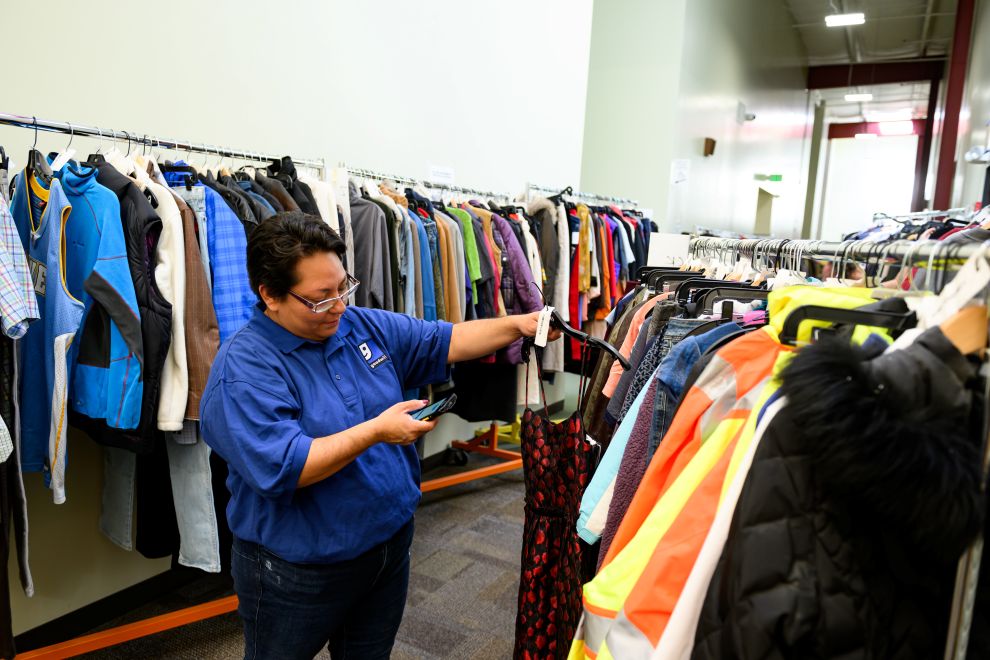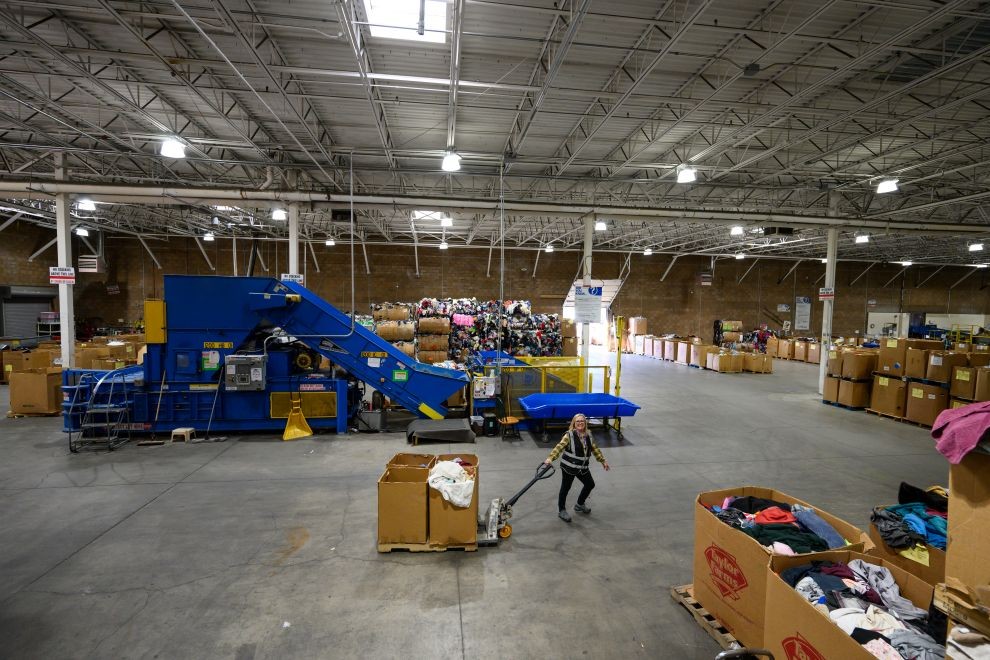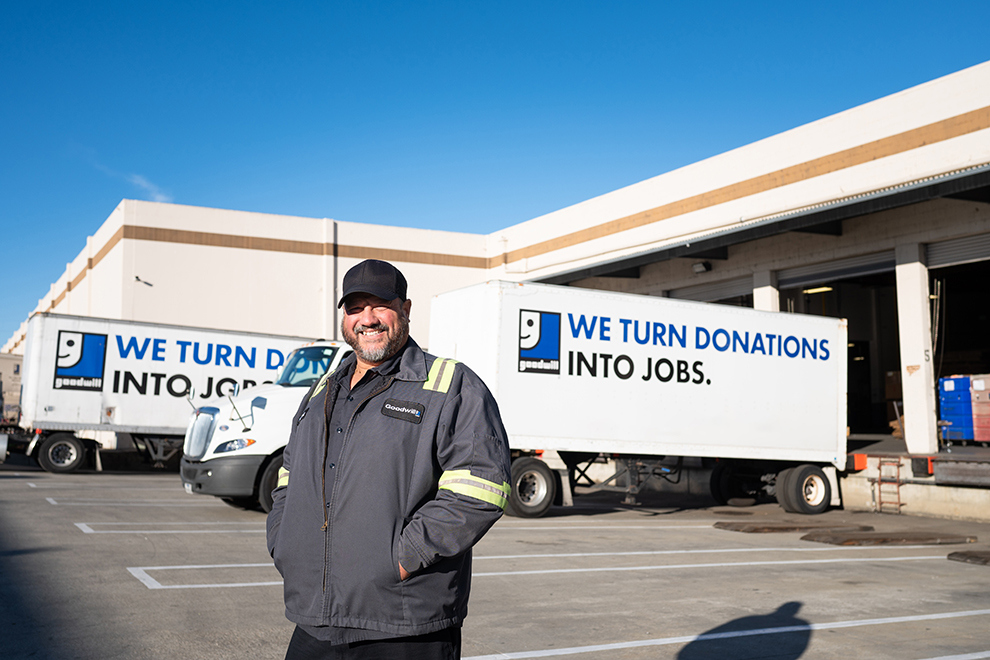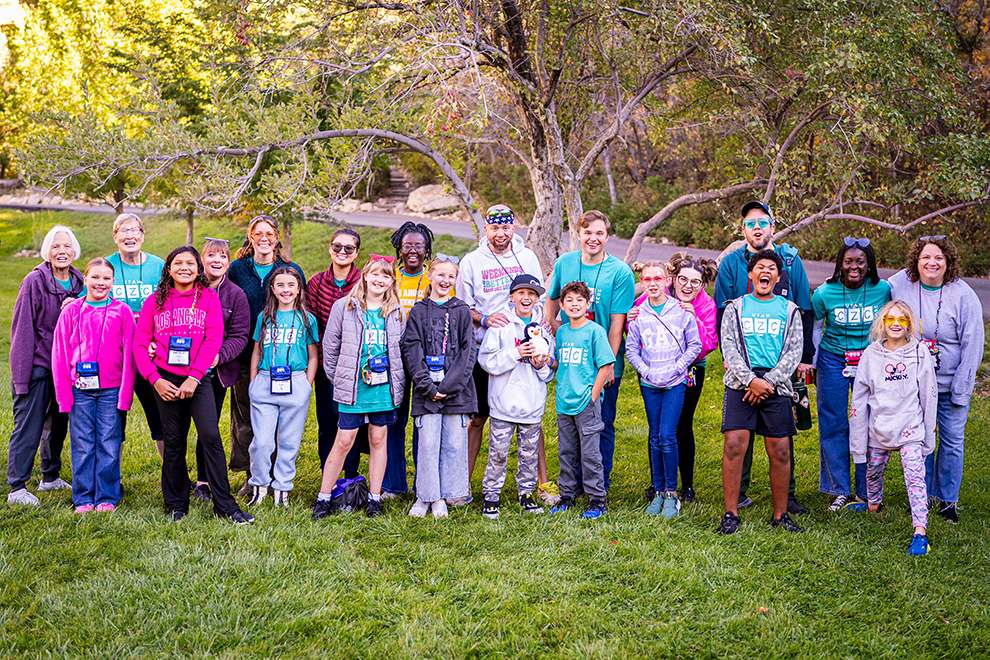For some savvy shoppers, Goodwill is the place to go to fill gaps in their wardrobe or outfit rapidly growing children. They appreciate the half-off sales on the “color of the week,” which corresponds to a garment’s tag, and they enjoy the hunt for a designer purse or barely worn pair of shoes.
For others, Goodwill is a place where they can drop off clothes that no longer fit, excess dish or glassware inherited from relatives, and furniture and home decor that doesn’t suit their new aesthetic. Donations are gladly received, and a receipt for a tax deduction is readily offered.
But at its core, Goodwill is an employer, a place where people get “a hand up, not a hand out,” to quote the nonprofit’s founder, Methodist Rev. Edgar J. Helms. To that end, Goodwill of Central and Coastal Virginia (GCCV), the local autonomous affiliate of Goodwill Industries International, has shifted its approach to how it helps those whose greatest need is employment.
“Before COVID, we had community employment centers where anyone could walk in and apply for jobs [in the community],” says Laura E. Faison, GCCV’s chief communications officer. “We also offered classes – from computer skills to soft skills to certified nurse assistant [training] – that were free and open to the public. But people who came needed a paycheck, and they needed it yesterday.”
After closing the employment centers during the pandemic, Goodwill shifted its approach and now helps people find employment by hiring them outright. These new Goodwill employees get paid while they receive training, job coaching, and skills classes via the Goodwill Academy of Virginia, which was officially launched in 2023.
“We are meeting that immediate need of a paycheck,” Faison says. “Being a retail operation, we constantly have openings.”
Learn While You Earn

Faison says that many of GCCV’s more than 1,300 associates are heads of households or sole providers for their families. As in any other workplace, those associates have financial goals and career aspirations. To support those ambitions while also providing a pathway into the workforce for people who may face employment barriers due to a disability, previous incarceration, or precarious housing, GCCV has implemented a “learn as you earn” strategy, introduced by CEO Mark Barth when he took the helm in 2020.
“[Barth] saw an opportunity to employ people in open Goodwill jobs and provide training to help them advance to the next level of their career journey, whether that was with Goodwill or elsewhere in the community,” Faison says. “This is really the foundation of Goodwill from its earliest days, where employment and training simultaneously ensure the best long-term success.”
Because of the local Goodwill’s size – serving 44 cities and counties in Central and Eastern Virginia with $81.6 million in total revenue in 2023 – there’s a variety of jobs to be found in addition to working at a register or rearranging merchandise in one of GCCV’s 34 retail locations. Workers are also needed in transportation, logistics, human resources, development, even driving warehouse forklifts. A job shadowing program is also available for someone contemplating a career shift.
“From an internal perspective, if we have someone who’s a cashier who wants to move into management, then we try to help them get there,” says Matt Stegall, vice president of donated goods. “We want to help them take that retail experience and grow their career.”
Faison notes that each career path looks different. “Our goal is to get individuals to the place they want to be in their career path, even if that’s somewhere else,” she says. “My [personal] goal is not to go anywhere [beyond Goodwill], but that could be the goal for someone else.”
GCCV also offers vocational programs for people with disabilities, providing both individual and group support so people can find jobs suited to their skills and interests to help them succeed. In November 2024, the Commission on Accreditation of Rehabilitation Facilities again awarded GCCV with a three-year accreditation certificate, indicating strong employment support, job development, and employment planning services.
In August 2024, GCCV hosted Virginia Gov. Glenn Youngkin as he announced the “Stand Tall – Stay Strong – Succeed Together” initiative, an effort designed to help those released from incarceration find stable housing and employment, which can prevent recidivism. Goodwill hosts job fairs in prisons and can assist with re-entry by offering guidance on social norms and technology development.
Shop ‘til You Drop

Every one of the more than 150 autonomous Goodwill organizations operating in the United States and Canada relies on donations to fuel its sales. That’s not typical, Stegall says, noting that in a prior retail job, he was the one who made decisions about what would be sold. “I would have a plan and place orders,” he says. “Here, I have no idea what’s coming. Donors take care of us every single day, and we have to figure out how to best use what comes in.”
Goodwill utilizes multiple sale points, trying to reach buyers shopping at every level. The first line of sale is what is most visible: a retail outlet. “We check everything for quality and get it to the floor as quickly as we can,” he says. Merchandise that doesn’t sell in a retail store in four weeks is transferred to one of GCCV’s outlet locations in Richmond, Hampton, and Virginia Beach. There, clothing, shoes, accessories, and housewares are sold by the pound, while larger items such as furniture are individually priced.
Goodwill also operates E-Recycle stores in Richmond and Hampton. Donated electronic devices – desktop computers, laptops, tablets, iPads, LCD flat-screen televisions, smartphones, gaming consoles, and video games – are refurbished and wiped of all data using a U.S. Department of Defense-grade program. For electronics that can’t be refurbished and resold, Goodwill has partnered with Dell, which takes the items and breaks them down for safe disposal.
If you want an auction, Goodwill has that, too. Merchandise that doesn’t sell or fit in retail stores is sold individually or in lots. Auctions happen every Monday, Wednesday, and Friday morning in Richmond at 6301 Midlothian Turnpike, at Goodwill’s Central Virginia support center, and Tuesday and Thursday evenings in Virginia Beach. Or check out Goodwill’s online auction, where you might find a Tiffany necklace, a poster signed by a former NFL football player, or partially used bottles of perfume.
“The way I look at every donation is that it’s our obligation to maximize that donation,” Stegall says. “Donors choose us to get that revenue, so we use all kinds of avenues to move [merchandise] as quickly and as efficiently as we can.”
Of course, there are some items that just don’t sell. Those go into Goodwill’s salvage stream, sold by the tractor-trailer load to U.S. purchasers who often recycle the goods for other purposes.
What items does Goodwill want? That question doesn’t have a simple answer, Faison says. “The rule of thumb is generally if you would give it to a friend or neighbor, it has life to it,” she says. “That’s one of the main ways people can help us ensure that items are sold, not salvaged. We try to get everything we can out of donations. We turn very little away – dangerous items or something that’s obviously soiled. We may not think there’s life in something, but then an influencer can take it and make new clothing.”
Goodwill, Stegall says, is out of the ordinary. “This is retail, but it’s a different type of retail, with a better mission that’s interconnected,” he says. “If we’re not running as the most efficient business we can, that doesn’t work. I don’t want to tell you not to bring your stuff.”
By the Numbers

Nearly 20 years ago, a rumor began circulating that Goodwill was owned and run by a man named Mark Curran, who pocketed more than $2 million in compensation annually. The problem with the rumor? It was 100 percent false.
Goodwill Industries International is an umbrella nonprofit organization that oversees the independent Goodwill affiliates, of which GCCV is one. Executive salaries for all Goodwill affiliates are searchable online via IRS Form 990 and other organizations that track nonprofits’ finances. Faison says the organization continues to battle the perception that it’s a for-profit business, even as Goodwill Industries is ranked second on The NonProfit Times’ list of quality charitable organizations.
“We have a whole page on our website; we’re very transparent,” Faison says. “We believe the best defense is a good offense. We love the opportunity to answer questions from people.”
Faison notes that CEO Barth’s salary is less than 1 percent of GCCV’s total operating revenue, and that the board of directors – all of whom are community members – sets executive compensation. “It’s a really robust organization to run, with many moving parts,” she says. “There’s a misconception that CEOs of other nonprofits don’t take salaries or take a penny [in compensation]. We want to encourage people to look into that.”
Another criticism levied against Goodwill is that it underpays some workers – specifically those with disabilities. Faison says arriving at the right salary is particularly challenging for any person who receives federal or state benefits. “People can earn up to a certain amount, or they lose benefits,” she says. “Our ultimate goal is for people to become as self-sufficient as they can as quickly as they can. But if I pay you $200 more per month and then you lose $400 in benefits, there’s a net loss.”
Faison adds, “We have conversations with folks who want to improve their wages – maybe they started as a cashier and want to move into leadership – but that can cause them to lose their housing or SNAP benefits. That’s a real challenge for not only our workforce but the hourly workforce across the region. We’re having lots of conversations with the Department of Social Services about how to create a more stair-step [system] and not a cliff as workers are trying to do the right thing and earn more money through work.”
Ultimately, Stegall says, Goodwill’s success relies on a collective effort with one goal: “There’s a strong mission [at Goodwill], but it’s a business at the end of the day. We’re running that business to succeed.”
And that success comes in many forms, whether it’s helping community members in their job search, offering jobs to those facing employment barriers, receiving donations to mitigate items ending up in landfills, or simply offering a place for thrifty shoppers to find secondhand treasures. While people may not be familiar with all of Goodwill’s missions and efforts, it’s hard to ignore the life-changing work the organization is doing and the overall impact it’s making in the community.





